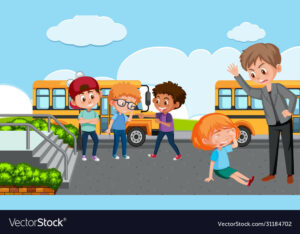All over the world, children are being bullied by adults in school. New research now shows that these students could also be at increased risk of being bullied by their fellow students.
The 2021 Student Survey shows that 1.2 per cent of Norwegian students are bullied by adults in school two to three times per month or even more frequently. New research now shows that many of the students who are subjected to bullying from teachers or other adults in school are also bullied by their fellow students.
 VectorStock image
VectorStock image
“The negative behaviour of teachers can ‘rub off’ on students and influence how they behave towards one another,” says Kari Gusfre, who recently published an article on this topic.
A global problem
Together with colleagues at the Norwegian Centre for Learning Environment, Gusfre’s study reviewed previous research looking at adults who bully children in a global school context. They conclude that it is a global problem affecting students from many different countries and in different contexts.
Bullying can take place in several different ways. Some students experience psychological bullying, such as being made fun of in front of the rest of the class or being called hurtful names, while others experience more physical bullying in the form of having their arm squeezed hard, being held down or pushed by their teachers.
“The problem seems to affect older students and in particular boys,” Gusfre says.
Another study, based on figures from the 2018 Student Survey, shows that many of those who are bullied by adults in school are at greater risk of being bullied by fellow students.
“This could be the result of a vicious cycle where students see what the teachers do and copy their behaviour,” she adds.
May be due to negative relationships
The Assistant Professor explains that students with behavioural issues and anti-social behaviour may be particularly vulnerable to being abused by adults in school. That is, students who often find it difficult to keep up with the teaching or who are otherwise noisy and disruptive in the classroom.
Limited research has been conducted with regard to teachers abusing students. It appears to be a complex group without any differences in terms of gender. The motives for bullying also vary, but a feeling of inadequacy in demanding situations appears to constitute a risk, as well as teachers themselves having been subjected to bullying earlier in life.
“We also found that negative relationships between students and teachers also increased the likelihood of a teacher bullying their students,” says Gusfre.
The research review also shows that certain teachers bully students because they feel a need to maintain a sense of power and dominance in the classroom.
No surprise
Previous research shows that the authoritative adult role works best, including for teachers in the classroom. The study, which reviews previous research, shows that this is not always the ideal for all teachers or that they are unable to realise it.
“Teachers who bully students might have a more authoritarian or neglectful leadership style,” Gusfre explains, without being particularly surprised about these new findings.
“Unfortunately, I am not surprised. For several years now, students have been asked questions about bullying by teacher in the Student Survey. The figures have gone down over the last few years. This is a positive development, but we still know that this is a very serious matter for the students in question. We also need to take into account the fact that there could be some hidden figures,” she says.
Affects the entire class environment
Students who are subjected to bullying may experience anxiety and depression that impair their quality of life and may affect learning outcomes. They may also develop significant difficulty functioning later in life and may find it difficult to find – and keep – a job. A bullying situation also affects the entire class environment. Not only for those who are subjected to bullying but also for fellow students who are more or less bystanders in the bullying that takes place.
In order to prevent students from being bullied by adults in school, attentive adults and a well-functioning school management team that dares to put this sensitive topic on the agenda will be required. This means adults who pay attention and intervene if they discover bullying, including situations in which the perpetrator is a colleague. Intervening entails supporting the student(s) subjected to bullying and reporting the matter to the school management team so that the teacher in question can be handled in the best possible way. The initiatives that are implemented will depend on the situation in question and require the school to conduct thorough investigations.
Experienced teachers intervene
In the review study the researchers found that if other adults in the school discovered that a student was being subjected to bullying by a teacher. ,they rarely did anything about it.
“One finding shows that if any of the adults did anything about the situation when discovering that a teacher was bullying students, it tended to be the most experienced teachers who would intervene and do something about the situation. This could include speaking directly to the teacher who was abusing the student or speaking to the student who had been bullied and also reporting the matter to management,” says Gusfre.
She emphasises the importance of all adults paying attention to what happens at school. They are required to do this pursuant to the activity requirement set out in the Norwegian Education Act, which requires adults to pay attention, intervene, report, investigate and implement measures. However, when it comes to bullying by adults, it can be both difficult to discover and challenging for an employee to know what to do. It is therefore necessary to ensure that adults have the opportunity to gain more knowledge of the fact that this type of bullying can occur, what to look out for and how to manage the situation if it occurs. The schools must acknowledge this as a possible problem and have a plan for how to deal with it. It is a subject that is highly sensitive and very serious, so serious that teachers and schools avoid speaking about it.
Text: Maria Gilje Strand (University of Stavanger)
Reference:
Gusfre, K.S., Støen, J. & Fandrem, H. (2022). Bullying by Teachers Towards Students—a Scoping Review. Int Journal of Bullying Prevention. https://link.springer.com/article/10.1007/s42380-022-00131-z
